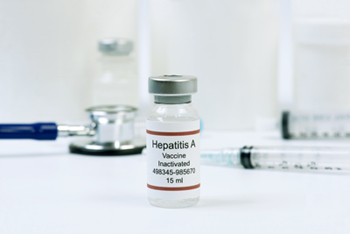South Carolina health officials report that an employee of City Billiards tested positive for hepatitis A. Customers who ate there between January 22 and February 5 could have been exposed to the virus.

Image/National Institute of Diabetes and Digestive and Kidney Diseases
This is the second case of hepatitis A diagnosed in an Aiken-area food handler in February. At this time, the Department of Health and Environmental Control (DHEC) is not aware of a known connection between the two cases.
In light of these findings, DHEC is declaring a hepatitis A outbreak in Aiken County. An outbreak is defined as an unexpected increase in the number of cases in a geographic area or time period. There have been 10 hepatitis A cases diagnosed in Aiken County since December 1, 2018.
It is important to note that these cases are not a food-related outbreak. In this case, as well as the case reported on February 4, 2019, DHEC State Epidemiologist Dr. Linda Bell says, “The risk of the hepatitis A virus spreading from an infected employee to customers in a restaurant setting is low. The concern is with a food handler with hepatitis A infection, not the restaurant.”
Post-exposure vaccination is recommended for individuals who have not been previously vaccinated if it can be administered less than two weeks from their date of consuminganything from the restaurant, with the last date of exposure being February 5, 2019. DHEC will offer no-cost hepatitis A vaccines to individuals who may have been exposed as a precaution.
Customers and staff who ate food prepared at the restaurant from January 31 – February 5 are encouraged to contact their healthcare provider, or come to the Aiken County Health Department located at 222 Beaufort St. NE in Aiken for post-exposure treatment on the following date and times:
- Thursday, February 14, from 10 a.m. – 6 p.m.
- Friday, February 15, from 10 a.m. – 6 p.m.
- Saturday, February 16, from 10 a.m. – 4 p.m.
The vaccine is not shown to prevent infection when administered more than 14 days after a specific exposure. However, vaccination more than 14 days after exposure will give long-lasting protection from infection from future exposures.
As of today, customers and staff who ate at the restaurant between January 22 – January 30 are not likely to benefit from post-exposure vaccination.
- Congenital syphilis in Arizona: 53 cases in 2018
- Tennessee hepatitis A outbreak doubles since November
- Jamaica dengue: Six confirmed deaths to date
- Ukraine: 8th measles death of 2019 reported
- Measles outbreak response: Multiple agencies working together
- Oman reports 6th MERS case, Saudi Arabia cases continue to climb
- Kentucky hepatitis A death toll jumps to 40 after review
- Measles, vaccines and Ebola with Dr Rob Cohen

